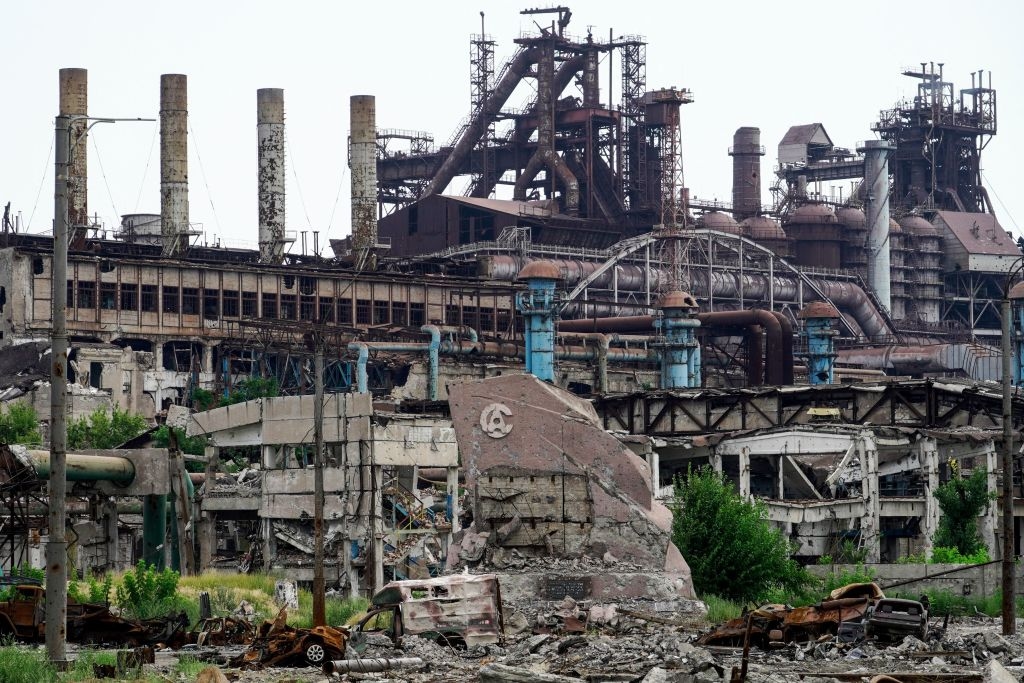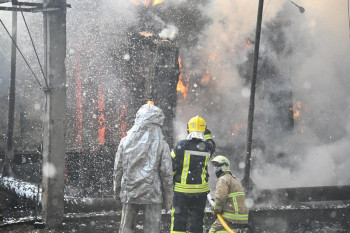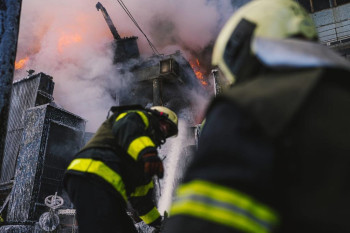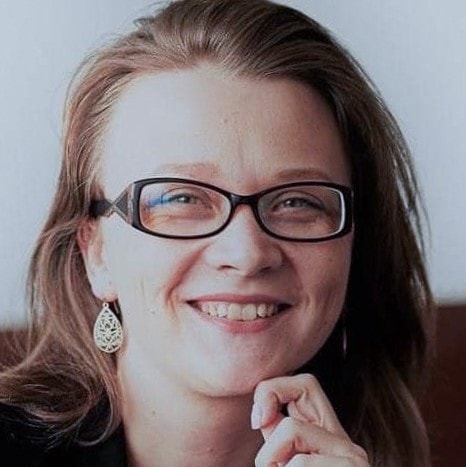It took several months of Russia’s full-scale invasion to turn some of the most valuable assets of Ukraine’s richest man Rinat Akhmetov into a pile of dust, metal, and concrete.
The tycoon's long list of painful business losses includes the Mariupol-based Azovstal steel plant, one of the largest in Europe, and Ukraine’s second-largest metallurgical enterprise Ilyich Iron and Steel Works.
According to the Bloomberg Billionaires Index, as of Oct. 31, Akhmetov’s net worth fell by 52% to $5.39 billion compared to the pre-war numbers. He now ranks 412th among the richest people globally, 278 positions lower than at the beginning of the year. He is the only Ukrainian on the list.
In total, around 70 enterprises owned by Akhmetov’s SCM Group, including thermal power plants, a mammoth coke-chemical plant in the city of Avdiivka, Donetsk Obalst, renewables, and branches of his First Ukrainian International Bank, were destroyed, damaged, or occupied by Russians, Liga media outlet reported.
Metinvest, one of Europe’s largest suppliers of iron ore controlled by Akhmetov, has suspended the work of its most profitable assets – three ore beneficiation plants in Dnipropetrovsk Oblast – partly due to logistics problems following Russia’s blockade of the Black Sea.
Akhmetov's agroholding HarvEast also suffered. It operates principally in Donetsk Oblast, most of which has been occupied. Since February, it has lost control over some 90,000 hectares, or 70% of the company's total landbank.

At the beginning of September, almost 52,000 tons of the holding’s agricultural products, as well as 200,000 tons of metal and cast iron worth $170 million were stuck in the occupied territories, out of reach for the company.
“Russia is cynically stealing our grain as well as steel in Mariupol,” said Akhmetov in a rare interview with the Italian newspaper Corriere della Sera in July.
According to the oligarch, the total value of finished goods and raw materials stolen by Russia from his companies is about $1 billion.
In addition, the mining of some 5,000 hectares in Kyiv Oblast made it impossible to carry out the sowing campaign in spring, according to HarvEast’s CEO Dmytro Skornyakov.
“As a result of hostilities, there are explosions and damage to agricultural equipment,” Skornyakov added. “The situation is extremely difficult for us.”

Energy under attack
The SCM’s DTEK – Ukraine’s largest private energy company controlling a third of the energy market and being responsible for mining 90% of the country’s coal – suffered no less.
The value of the company has decreased threefold, from a pre-war $1.9 billion to $580 million as of mid-summer, according to the Forbes magazine estimations.
On the second day of the full-scale invasion, DTEK lost control over the Luhansk thermal power plant, the only source of electricity for one million people living in the north of the now nearly completely occupied Luhansk Oblast. According to DTEK’s CEO Maxim Timchenko, the takeover of the plant cost the company $180 million.
Another thermal power plant that belongs to DTEK was seized by Russians in Enerhodar, a city in Zaporizhzhia Oblast, which is also home to the Zaporizhzhia Nuclear Power Plant.
In total, about 2.5 million people were cut off from electricity in Russian-occupied territories, Timchenko reported during a press conference on Oct. 13.
After more than seven months of the all-out war, Russia switched its focus to destroying Ukraine’s energy facilities. Moscow openly admits that Ukraine’s energy infrastructure is one of its main targets now. According to the Geneva Conventions, striking vital public infrastructure is a war crime.
Just in the first two days of Russia’s campaign to shut down Ukraine’s energy infrastructure, on Oct. 10-11, Russia launched 83 missiles and 24 Iranian-made Shahed-136 kamikaze drones to attack multiple cities across Ukraine, including Kyiv, Lviv, and Dnipro. The attack killed 23 people and injured more than 100.
As a result of the strike, 30% of the country’s energy infrastructure was damaged and DTEK had to start rolling blackouts across the country.
As DTEK repairs its damaged facilities, Russia continues to target power infrastructure across Ukraine. Since Oct. 10, Moscow has carried out two more massive strikes on the energy infrastructure, in addition to regular single-target attacks.
Following the very recent, third massive attack on the energy system on Oct. 31, DTEK said that it was running out of equipment to repair the inflicted damage.
DTEK also had to allocate additional funds for the repair of damaged power grids in the liberated territories and restore the electricity supply.
In Kyiv Oblast alone, the figure has already reached $8.3 billion. Another $30 million DTEK will have to spend to bring all power grids to the pre-war state, according to the company’s spokesperson Antonina Antosha.
“But the company’s biggest losses are not financial, but human,” she told the Kyiv Independent.
As of Oct. 13, 85 DTEK employees were killed in combat as they joined Ukraine’s Armed Forces and three of its engineers were killed while at work.
Renewables
At the beginning of the year, renewable energy sources in the country accounted for 8.3% of all electricity generation, with a forecast of it growing to 9.2% by the end of 2022.
But because of the invasion, as of late October, Ukraine has lost 90% of its wind power plants in Russian-occupied southern regions, as well as half of its solar power stations, according to Energy Minister Herman Halushchenko.
They were either destroyed, damaged, or occupied by Russia. “It's definitely a huge loss,” Halushchenko said.
Half of them are owned by Ahkmetov. His DTEK Renewables alone lost three wind power plants and one solar with a total capacity of 510 megawatts installed in the southern Kherson and Zaporizhzhia oblasts.
The list includes the 100-megawatt Orlovska wind farm with 26 Vestas wind turbines worth $145 million and the 200-megawatt Prymorska wind farm worth $350 million. Both are located in Zaporizhzhia Oblast. Another one, the 200-megawatt Botievo wind farm, is in Kherson Oblast.
“They are not destroyed, not damaged, but they are not operating,” said Timchenko.
Banking
Since Feb. 24, Akhmetov’s First Ukrainian International Bank has lost control of every eighth branch, or a total of 31 branches. Some of them were badly damaged.
In Mariupol, where Russians heavily bombarded civilian infrastructure and killed an estimated dozens of thousands of civilians, the bank lost control of 95 ATMs and 16 branches. In two other eastern cities – Kharkiv and Sievierodonetsk – the war completely destroyed two of the bank’s branches.
In January-August, the bank's profit decreased 15 times, dropping to $6.4 million compared to $98.5 million for the same period last year, Finbalance reported.
In addition, the long-awaited deal on the sale of Lviv-based Idea Bank, owned by Polish financial group Getin Holding, to Akhmetov’s bank was canceled.
The Warsaw-based financial group, which had been looking for a buyer for two years, cited the “geopolitical situation in Ukraine” as one of the reasons for canceling the plan on selling the asset.
Demanding reparations
In June, Akhmetov filed a lawsuit in the European Court of Human Rights against Russia seeking compensation for “trampling of his property rights.”
Although no specific amount of reparations has been announced, the SCM group says it wants billions of dollars in reparations from Russia.
According to the SCM group, reparations for destroyed Azovstal, which produced 4.3 million tons of steel in 2021, and Ilyich Iron and Steel Works alone vary from $17 to $20 billion. Together, the two plants produced 40% of Ukraine’s metallurgical products. According to the Ukrmetallurgprom association, by the end of the year, steel production in Ukraine is expected to drop threefold because of the war.
“Russia’s unjustified and brutal aggression against Ukraine has put a key question on the world’s agenda: the consistency, fairness, and effectiveness of the global legal system created after World War II,” said Akhmetov.
According to DTEK’s Timchenko, the company together with the Ukrainian government and other companies will file new claims against Russia, including for damages that the country inflicted on the company back in 2014, when Russia initially invaded Ukraine’s eastern Donbas region, which comprises Donetsk and Luhansk oblasts.
“We have legal grounds to make (those) claims. They (Russians) will be accountable as a state for all damages we have received since then,” Timchenko said.












